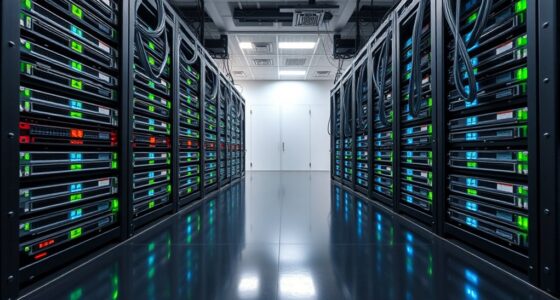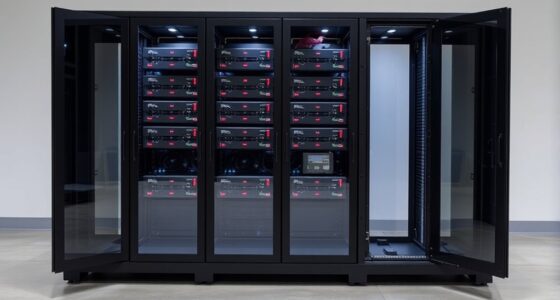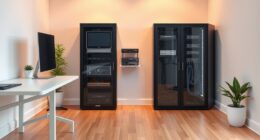I’ve explored the top high-capacity network storage options perfect for seamless data management. From affordable NAS devices like the Buffalo LinkStation 220 and TerraMaster F4 SSD for home use to powerful enterprise solutions like the QNAP TS-1655 and Synology DS1522+, there’s a range for different needs. External enclosures and rack-mounted options add flexibility, while key features like speed, security, and expandability matter most. If you keep exploring, you’ll uncover the best fit for your requirements.
Key Takeaways
- Consider enterprise-grade NAS with multiple drive bays, high processing power, and expandability for large-scale data needs.
- Prioritize models supporting fast network interfaces like 10GbE or multi-Gigabit Ethernet for seamless data transfer.
- Look for advanced security features such as encryption, RAID redundancy, and user access controls to protect sensitive data.
- Evaluate compatibility with your existing infrastructure, including OS support, drive types, and connectivity options like USB, PCIe, and NVMe.
- Choose solutions offering easy setup, remote management, and scalable storage capacities to accommodate future data growth.
BUFFALO LinkStation 220 12TB NAS Storage with HDDs
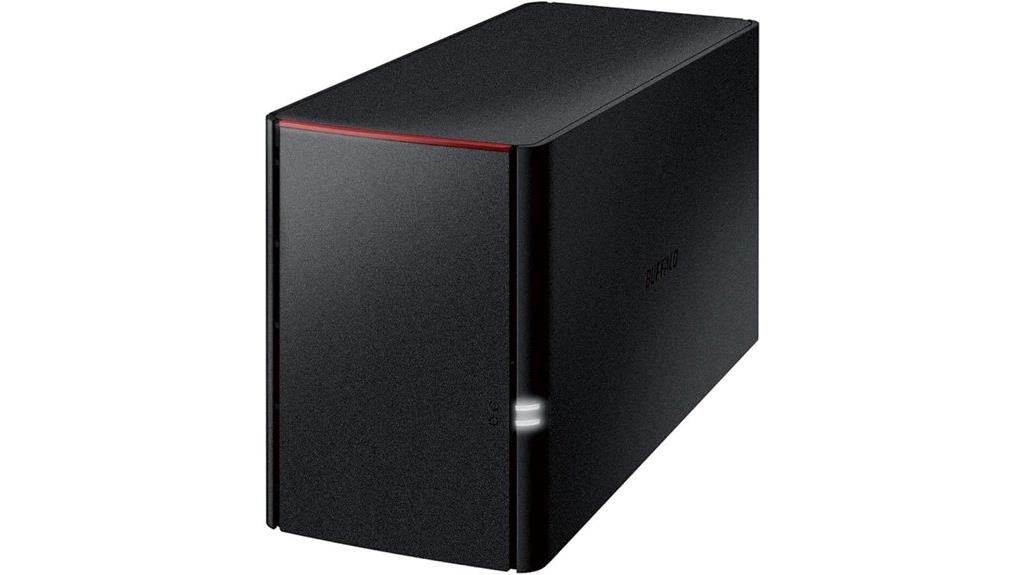
If you’re looking for a reliable and cost-effective network storage solution for your home or small office, the Buffalo LinkStation 220 with 12TB of HDD storage is a great choice. It offers flexible options with two drive bays, supporting RAID 1 for 6TB of protected storage or RAID 0 for the full 12TB. Connecting easily to your router, it allows shared access across Windows and macOS devices. With features like SSL encryption, RAID redundancy, and user management, your data stays secure. Plus, Buffalo’s 24/7 US-based support makes setup and troubleshooting straightforward. It’s an ideal, secure, and scalable solution for centralized data storage.
Best For: home users and small offices seeking reliable, secure, and scalable network storage with easy setup and management.
Pros:
- Supports flexible RAID configurations for data redundancy or maximum capacity
- Compatible with both Windows and macOS systems for seamless sharing
- Includes 24/7 US-based support to assist with setup and troubleshooting
Cons:
- Limited to two drive bays, which may restrict scalability for larger data needs
- Basic features may lack advanced cloud integration found in higher-end models
- Performance may be slower compared to more premium NAS solutions with faster hardware
TERRAMASTER F4 SSD NAS Storage

Looking for a compact yet powerful NAS that delivers lightning-fast data transfer and high-capacity storage? The TerraMaster F4 SSD NAS Storage fits the bill perfectly. It’s equipped with a robust quad-core processor, UHD graphics, and 8GB DDR5 RAM, ensuring professional-grade performance. With a 5GbE port, it offers speeds five times faster than standard Ethernet. Supporting four NVMe SSDs up to 8TB each, it provides a total of 32TB capacity. Its small, lightweight design makes it ideal for small spaces, and the tool-free setup allows quick installation. Plus, silent operation and advanced cooling keep it reliable under heavy workloads.
Best For: small businesses and home users seeking a compact, high-performance NAS with fast data transfer and substantial SSD storage capacity.
Pros:
- Compact and lightweight design for easy placement in small spaces
- Supports four NVMe SSDs up to 8TB each, totaling 32TB capacity
- Quiet operation with advanced cooling for reliable, heavy workload performance
Cons:
- Limited to SSDs; does not support traditional HDDs for mixed storage solutions
- May require familiarity with network setup for optimal use
- No included hard drives, so additional investment is needed for storage capacity
BUFFALO LinkStation 720 16TB 2-Bay NAS Storage with Hard Drives Included
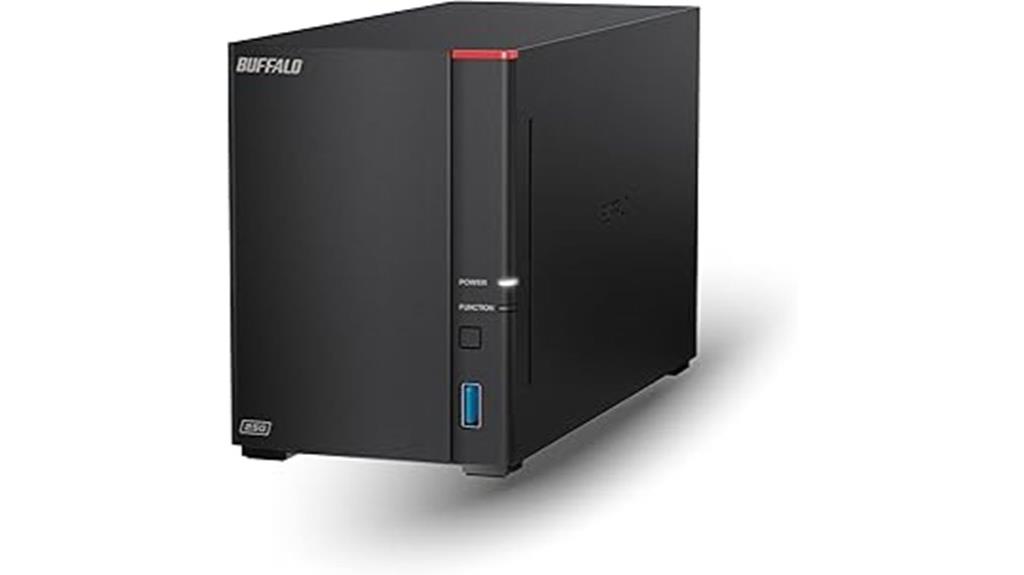
The BUFFALO LinkStation 720 16TB 2-Bay NAS Storage is an excellent choice for users who need reliable, high-capacity storage with straightforward setup. It features a 2-bay design supporting RAID 0 for full 16TB or RAID 1 for 8TB of mirrored storage, ideal for backups and media. Pre-installed hard drives speed around 5400 RPM, and setup takes just 5-15 minutes via a simple web interface. While transfer speeds of 8-24 MB/s can seem slow, they’re sufficient for basic file sharing and media streaming. The device includes features like remote access, USB direct copy, and data security options, making it suitable for home and small office use.
Best For: home users and small offices seeking an affordable, easy-to-setup NAS with ample storage and basic media sharing capabilities.
Pros:
- Simple setup process completed in 5-15 minutes with user-friendly web interface
- Supports RAID 0 and RAID 1 for flexible data redundancy and performance options
- Includes pre-installed hard drives and features like remote access and USB direct copy
Cons:
- Transfer speeds of 8-24 MB/s may be slow for large data transfers
- Reports of hardware failures and reliability issues within short periods
- Outdated hardware components and limited warranty support may impact long-term use
TERRAMASTER F4 SSD NAS Storage
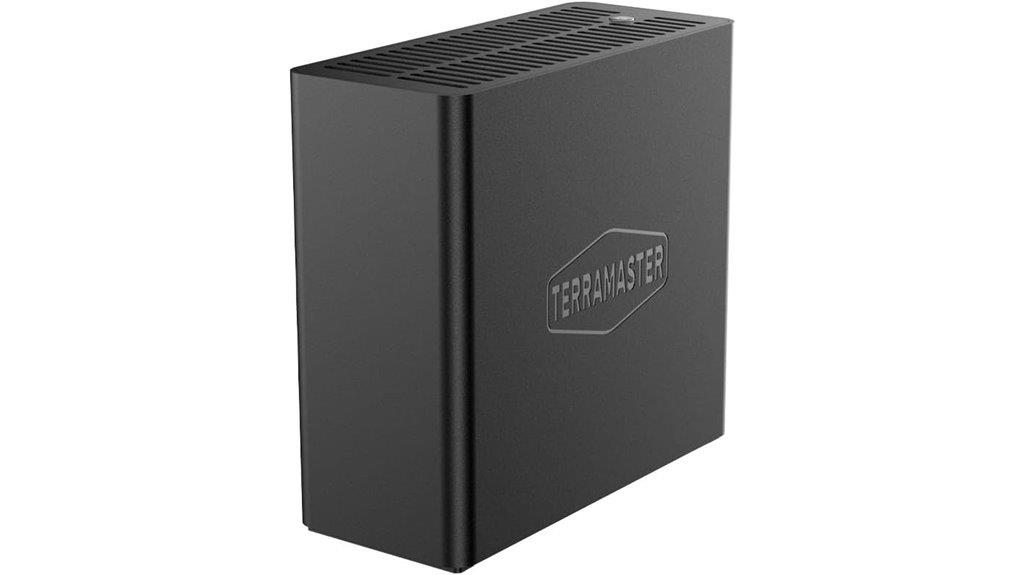
For professionals and small businesses seeking high-speed, reliable storage in a compact form, the TERRAMASTER F4 SSD NAS Storage stands out as an ideal solution. It packs a powerful N95 quad-core processor, UHD graphics, and 8GB DDR5 RAM, delivering fast performance. With five times the data transfer speed of standard Ethernet thanks to its 5GbE port, it supports four NVMe SSDs up to 8TB each, totaling 32TB. Its small, tool-free design makes installation quick and easy. Plus, its quiet operation and advanced cooling guarantee consistent performance and longevity, making it perfect for demanding workloads in limited spaces.
Best For: small to medium-sized businesses and professionals requiring high-speed, reliable, and compact SSD storage solutions with easy setup and robust data security features.
Pros:
- High-performance quad-core processor with turbo up to 3.4GHz and UHD graphics for demanding workloads
- Supports four NVMe SSDs up to 8TB each, providing a total of 32TB capacity for high-speed data access
- Compact, lightweight, and tool-free design allows quick installation and versatile placement in limited spaces
Cons:
- Limited to SSD storage, which may be more expensive than traditional HDD options for larger capacities
- No built-in network redundancy features like dual WAN ports for enhanced data security
- May require additional hardware or software for advanced enterprise backup and recovery needs
QNAP TS-1655-8G-US 16-Bay High-Performance Hybrid NAS

If you need a powerful storage solution capable of handling large-scale data, the QNAP TS-1655-8G-US is an excellent choice. It features an Intel Atom C-5125 8-core processor, clocking up to 2.8GHz, with 8GB DDR4 RAM that’s upgradeable to 128GB, supporting ECC. Its 16 drive bays accommodate both 3.5-inch and 2.5-inch SATA drives, offering substantial capacity. Dual 2.5GbE ports ensure fast network access, while three PCIe slots support 5/10/25GbE adapters, Fibre Channel, and other cards for expansion. Dual NVMe slots enable SSD caching, optimizing performance for file sharing, backups, and virtualization.
Best For: small to medium-sized businesses or tech enthusiasts seeking a high-capacity, high-performance hybrid NAS for intensive data storage, virtualization, and multimedia applications.
Pros:
- Powerful Intel Atom C-5125 8-core processor with up to 2.8GHz boost for demanding workloads
- Extensive storage capacity with 16 drive bays supporting both 3.5-inch and 2.5-inch SATA drives
- Flexible expansion options via three PCIe slots supporting 5/10/25GbE, Fibre Channel, and other cards
Cons:
- May be overkill for users with modest storage or performance needs
- Upgrading RAM to maximum 128GB could be costly and complex for some users
- Larger physical size might require more space and proper ventilation
TERRAMASTER F6-424 NAS Storage 6Bay

High-capacity storage demands a robust and flexible solution, making the TERRAMASTER F6-424 NAS ideal for media professionals, small businesses, and tech enthusiasts who need reliable, high-speed data management. Powered by a quad-core 3.4GHz CPU, 8GB DDR5 RAM (upgradable), and dual 2.5GbE ports, it delivers impressive performance, including a 140% boost over previous models. With support for multiple RAID configurations, dual M.2 NVMe slots, and fast network speeds up to 283 MB/s, it’s perfect for demanding workflows. Its tool-free drive trays and expandability options guarantee easy setup and future growth, making this NAS a versatile solution for high-capacity data needs.
Best For: small businesses, media professionals, and tech enthusiasts seeking high-performance, flexible NAS storage with robust hardware and expandability options.
Pros:
- Powerful quad-core CPU and upgradable RAM ensure excellent performance for demanding tasks
- Support for multiple RAID configurations and dual M.2 NVMe slots for caching enhance flexibility and speed
- Easy drive installation with tool-free trays and reliable thermal management
Cons:
- Limited external USB-A port may require hubs for multiple peripherals
- Some RAM modules can cause stability issues; compatible brands are recommended
- Original TerraMaster OS (TOS) has permission and transfer speed limitations, though alternative OS like Unraid improve performance
Synology DS1522+ 5-Bay NAS Bundle with 5 x 10TB WD Red Plus
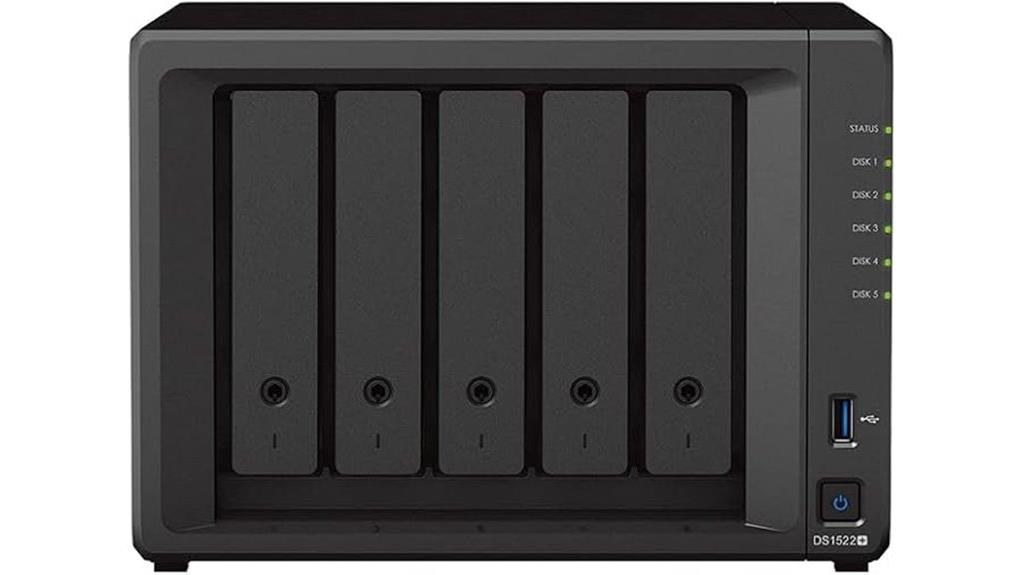
The Synology DS1522+ 5-Bay NAS Bundle with 5 x 10TB WD Red Plus is an excellent choice for small businesses and power users who need scalable, reliable storage. It features a robust AMD Ryzen R1600 processor, 8GB of RAM, and support for up to 15 drives, making it versatile for demanding workloads. With dual 10GbE ports, NVMe SSD caching, and easy expandability, it delivers impressive transfer speeds and performance. The device runs DSM, offering intuitive management and a suite of apps for backup, synchronization, and surveillance. Its solid build, reliable operation, and scalability make it ideal for media, backups, and multi-user environments.
Best For: small businesses and power users seeking scalable, reliable storage with high performance for demanding workloads and multi-user environments.
Pros:
- Supports up to 15 drives with scalable storage options for future expansion
- Equipped with a powerful AMD Ryzen R1600 processor and 8GB RAM for demanding tasks
- Features dual 10GbE ports and NVMe SSD caching for fast data transfer and improved performance
Cons:
- Higher price point due to advanced features and proprietary storage modules
- Some software features, particularly with DSM 7.2, are limited or outdated
- External storage compatibility may require caution and added configuration
QNAP 2 Bay DAS with 8TB Storage Capacity and HDD Bundle
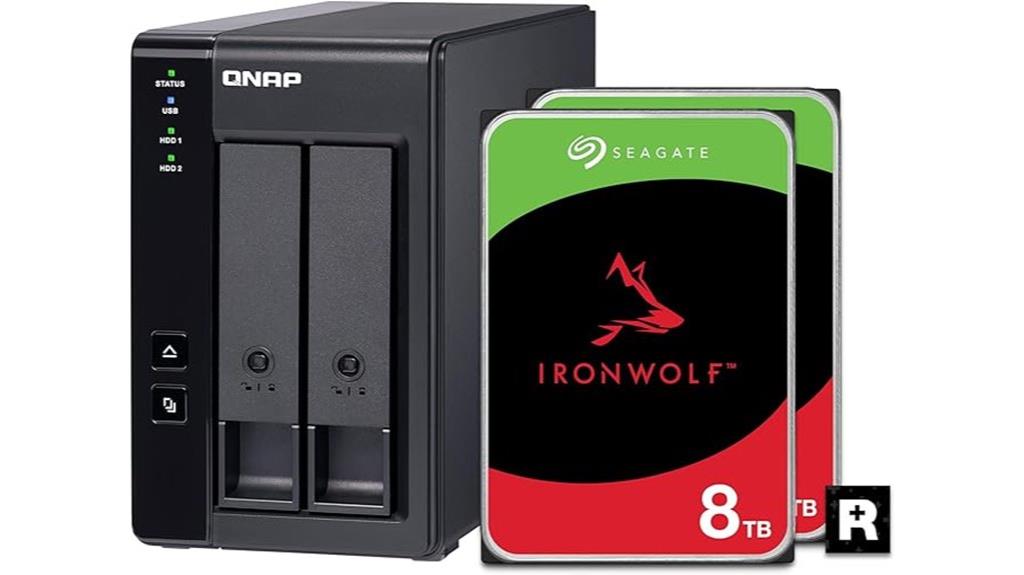
For professionals who need reliable, high-speed external storage, the QNAP 2 Bay DAS with 8TB of preconfigured RAID 1 stands out as an excellent choice. It includes two 8TB Seagate IronWolf drives, supporting up to two 3.5-inch SATA disks, offering dependable, high-capacity storage. The device supports RAID 0, 1, JBOD, and single disk modes, with RAID 1 providing data redundancy. It connects via USB 3.2 Gen 2 Type-C for fast data transfer and works seamlessly with Windows, macOS, and Linux. Whether used as external storage or NAS expansion, it’s versatile, easy to set up, and backed by a 3-year Rescue Data Recovery Services plan.
Best For: professionals and small teams seeking reliable, high-speed external storage with data redundancy and versatile connectivity options.
Pros:
- Supports multiple RAID configurations, including RAID 1 for data redundancy
- High-speed data transfer via USB 3.2 Gen 2 Type-C connection
- Comes with two 8TB Seagate IronWolf drives and a 3-year data recovery service
Cons:
- Limited to two drive bays, which may restrict scalability
- Requires compatible USB Type-C port for optimal performance
- May be overkill for users with minimal storage needs
UGREEN 4-Bay Desktop NAS (DH4300 Plus)
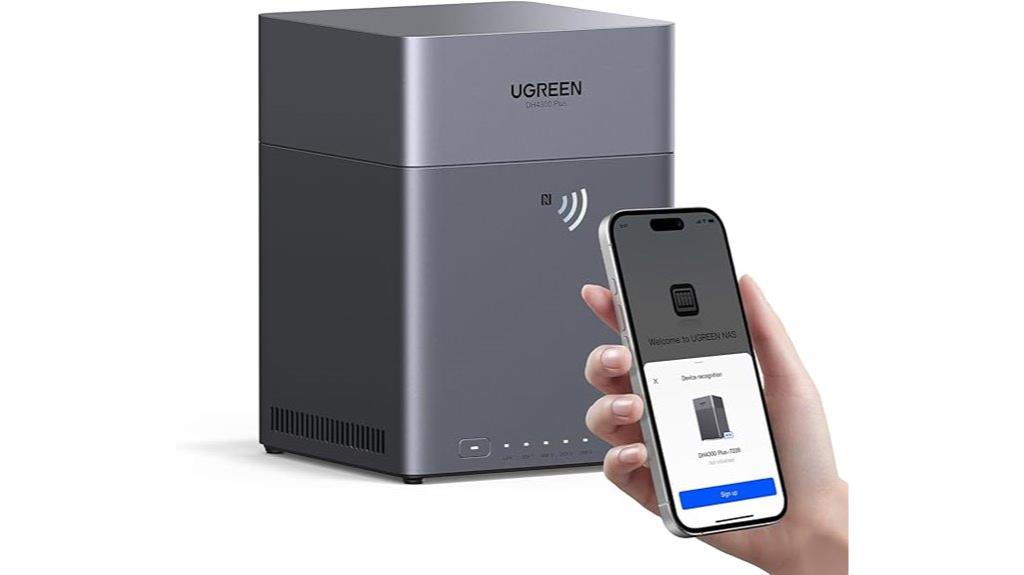
If you need a reliable, large-capacity storage solution that’s easy to set up and use, the UGREEN 4-Bay Desktop NAS (DH4300 Plus) is an excellent choice. It supports up to 120TB, perfect for extensive data like millions of photos or files, and works with third-party drives from top brands. Its high-performance processor, 8GB RAM, and 2.5GbE port ensure fast data transfer and smooth media playback. Designed for beginners, it offers simple NFC setup, remote access, and seamless multi-device sharing. Plus, automatic backups, encryption, and AI features make data management secure, efficient, and cost-effective, replacing ongoing cloud costs with a one-time investment.
Best For: individuals or small businesses seeking a large-capacity, easy-to-use, secure, and cost-effective storage solution for extensive data management and media sharing.
Pros:
- Supports up to 120TB capacity, accommodating millions of files and media effortlessly
- User-friendly setup with NFC, remote access, and multi-device sharing for beginners
- Advanced security features including encryption and AI-powered photo management
Cons:
- Disks are not included, requiring additional purchase from third-party brands
- May be overkill for users with minimal storage needs or less technical experience
- Higher upfront cost compared to basic external drives or cloud options
StarTech.com 2U Server Rack Shelf
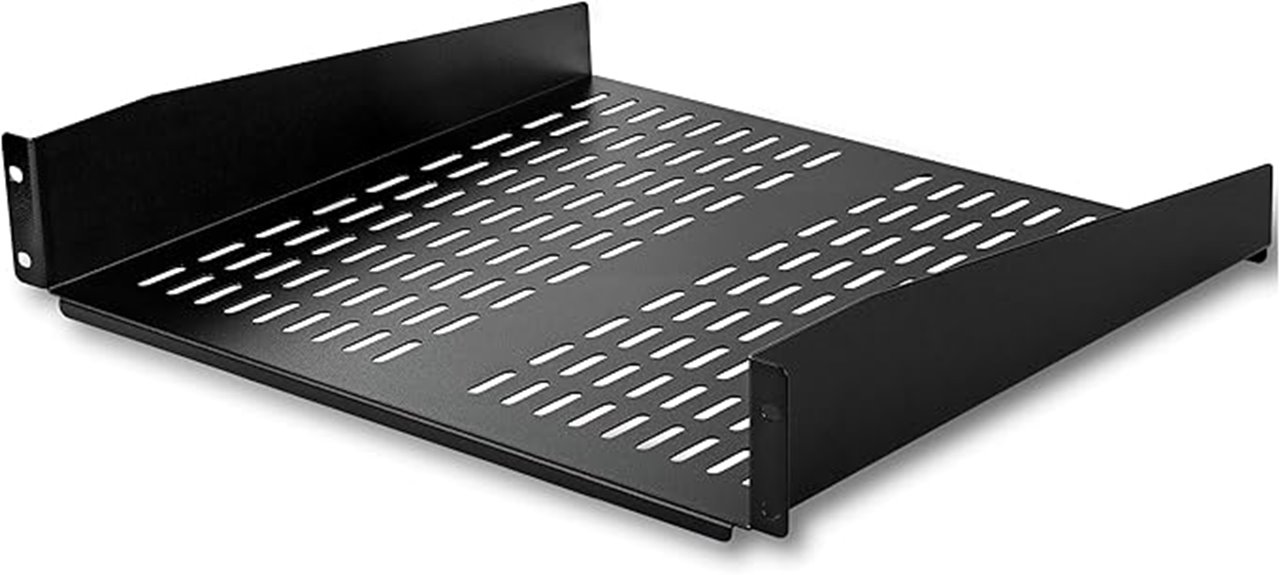
Looking for a reliable solution to expand your server rack’s storage and organization? The StarTech.com 2U Server Rack Shelf is an excellent choice. It’s designed to fit virtually any 19-inch rack or cabinet, supporting equipment up to 16 inches deep. Its vented design ensures proper airflow and heat dissipation, keeping your hardware cool. Made from durable cold-rolled steel, it supports up to 50 pounds of equipment, making it perfect for servers, tools, or A/V gear. With its sturdy construction and versatile use, this shelf helps optimize space and maintain efficient airflow in home, studio, or office environments.
Best For: IT professionals, data centers, and home or office users seeking durable, versatile rack-mounted storage solutions for organizing servers and hardware.
Pros:
- Universal 19-inch fit compatible with most racks and cabinets
- Ventilated design enhances airflow and heat dissipation
- Made from durable cold-rolled steel supporting up to 50 pounds
Cons:
- Depth limited to 16 inches, may not fit larger equipment
- Fixed size (2U) may limit customization for specific setups
- No additional features like adjustable brackets or cable management
BUFFALO TeraStation 3420RN 4-Bay NAS with 4TB Storage

The BUFFALO TeraStation 3420RN 4-Bay NAS with 4TB storage is ideal for small to medium-sized businesses seeking reliable, scalable network storage. It offers 2TB of usable space in RAID 1, expandable to 4TB via RAID 0, with pre-tested NAS-grade drives. The device supports iSCSI, hardware encryption, and flexible backup options, including cloud integration with Amazon S3, Dropbox, Azure, and OneDrive. Designed for data protection, it features a straightforward setup, but some users report hardware reliability issues over time. With a 3-year warranty and 24/7 US-based support, it balances ease of use with advanced features for organized, secure data management.
Best For: small to medium-sized businesses seeking reliable, scalable network storage with data protection and cloud integration.
Pros:
- Easy setup with straightforward RAID configuration and expansion options
- Supports hybrid cloud integration with major providers like Amazon S3, Dropbox, Azure, and OneDrive
- Includes a 3-year warranty with 24/7 US-based support for peace of mind
Cons:
- Reports of hardware reliability issues, including drive failures within weeks or after a year
- Sluggish backup performance with software like NovaStor, especially over gigabit networks
- Limited admin interface lacking advanced console access, which may hinder in-depth management
Synology DiskStation DS1522+ NAS Server Bundle

The Synology DiskStation DS1522+ NAS Server Bundle is an ideal choice for small to medium-sized businesses or power users who need reliable, high-capacity storage with versatile management features. It offers extensive capabilities like virtual machine management, security tools, and multimedia streaming, making it a versatile all-in-one solution. Powered by a Ryzen R1600 CPU, 32GB RAM, and pre-installed with 100TB of storage, it handles large files and backups efficiently. Its DSM operating system provides robust file management, snapshots, and encryption. Despite some software limitations and compatibility issues, its hardware reliability and all-encompassing feature set make it a strong contender for seamless data management.
Best For: small to medium-sized businesses and power users seeking reliable, high-capacity storage with advanced management features and multimedia capabilities.
Pros:
- Robust hardware with Ryzen R1600 CPU and 32GB RAM for efficient performance
- Extensive features including virtual machine management, snapshots, encryption, and multimedia streaming
- Pre-installed with 100TB of high-capacity storage suitable for large files and backups
Cons:
- Compatibility issues with included drives not supported by Synology software
- Software limitations and recent updates have hampered functionalities like Surveillance Station and DS Video
- Lacks higher network speed options such as 2.5GbE or 10GbE for faster data transfer
Factors to Consider When Choosing a High‑Capacity Network Storage Solution

When selecting a high-capacity network storage solution, I focus on understanding my storage needs and how quickly data must be accessed. I also consider security features to protect my data and guarantee compatibility with my existing setup. Finally, I look for options that are easy to set up and connect seamlessly with my devices.
Storage Capacity Needs
Choosing the right high-capacity network storage solution begins with understanding your current data volume and how much it’s expected to grow. I assess the types of files I store, like high-resolution videos or large datasets, to determine the capacity needed. It’s vital to contemplate if my storage needs will expand over time, so I look for scalable options that can grow with me. I also evaluate storage configurations, such as RAID levels, which influence usable capacity and data redundancy. Additionally, I make certain the storage aligns with my backup and disaster recovery plans to protect critical data effectively. By thoroughly analyzing my current and future storage requirements, I can select a solution that balances capacity, flexibility, and data protection, avoiding unnecessary over- or under-provisioning.
Performance and Speed
To guarantee my high-capacity network storage runs smoothly, I need to focus on performance and speed factors that impact data transfer and access times. Fast data transfer rates, such as 5GbE or higher, are essential for handling large files efficiently. Using SSD-based NAS devices markedly boosts read/write speeds, reducing latency for demanding applications. Multiple network ports, including link aggregation options, increase bandwidth and improve overall throughput. Powerful hardware components like multi-core processors and ample RAM enhance processing speed and multitasking capabilities. Additionally, supporting advanced standards like NVMe SSD caching or 10GbE interfaces further accelerates responsiveness. Prioritizing these features ensures my storage solution can keep pace with data demands, delivering seamless access and rapid transfer speeds for all my needs.
Data Security Features
Ensuring high-capacity network storage remains reliable and secure is just as important as achieving fast data transfer speeds. I look for solutions that incorporate robust encryption protocols like SSL/TLS and AES 256-bit encryption to protect data both during transfer and at rest. RAID configurations, such as RAID 1 or RAID 5, are essential for redundancy, safeguarding against drive failures. Secure user access controls and permission management help maintain data privacy while allowing granular sharing. Backup and snapshot features, especially those with ransomware protection, enable quick recovery and prevent data loss from cyber threats. Additionally, support for secure remote access and personal cloud storage guarantees I can access my data safely from outside the local network, providing peace of mind and seamless management.
Compatibility and Connectivity
When selecting a high-capacity network storage solution, compatibility and connectivity are critical to guarantee smooth operation and future-proofing. I focus on ensuring the device supports my operating systems—Windows, macOS, and Linux—for seamless file sharing and management. I verify that the network interfaces, such as Ethernet ports and Wi-Fi, support my required data transfer rates, whether 1Gbps or 10Gbps. It’s essential that the storage has compatible drive bays for the types and sizes of drives I plan to install, like SSDs or HDDs. Additional connectivity options, such as USB, eSATA, or PCIe slots, offer room for expansion. Finally, I check for reliable network protocols like SMB, NFS, or iSCSI, ensuring secure and flexible remote access across my network.
Ease of Setup
Choosing a high-capacity network storage solution with ease of setup can save you time and frustration. A user-friendly setup typically features clear instructions, guided configuration steps, and minimal technical knowledge needed. Devices with quick setup times—often under 15 minutes—allow for faster deployment and less hassle. NAS units with intuitive web interfaces and automated setup wizards make initial configuration and network integration straightforward. Plug-and-play features, such as pre-installed drives and minimal cabling, further streamline the process. Additionally, support for mobile apps or remote configuration tools can enhance convenience, enabling management from your smartphone or tablet. Overall, selecting a solution that simplifies setup helps you get your storage system up and running quickly, so you can focus on managing your data effectively.
Software and App Support
Selecting a network storage solution that offers robust software and app support can substantially enhance your user experience. I look for NAS devices that support the latest operating systems and receive regular firmware updates to stay compatible with new software and security standards. It’s also important to have a complete suite of native apps and third-party integrations for backup, media streaming, remote access, and file management. I prioritize user-friendly interfaces and management utilities that simplify app installation and ongoing maintenance. Advanced features like virtualization, AI-based photo recognition, or cloud sync through dedicated apps or APIs are also valuable. Additionally, I consider ongoing software support, community forums, and customer service to help resolve compatibility issues and software limitations quickly and effectively.
Reliability and Durability
Reliability and durability are essential factors in ensuring your high-capacity network storage solution remains dependable over time. I look for devices with robust hardware, like enterprise-grade drives and sturdy chassis, designed to handle continuous operation. Features such as RAID support, ECC memory, and hardware encryption help prevent data loss and hardware failures, boosting confidence in the system’s dependability. Durability also depends on build quality, heat dissipation, and redundancy options like hot-swappable drives and redundant power supplies. Long-term reliability is supported by manufacturer warranties, proven hardware stability, and regular firmware updates that address vulnerabilities and enhance performance. Additionally, reading user reviews and third-party tests gives me real-world insights into how well a device withstands extended use and environmental stressors.
Frequently Asked Questions
How Do I Ensure Data Security on High-Capacity NAS Devices?
To guarantee data security on high-capacity NAS devices, I always enable strong passwords and two-factor authentication to prevent unauthorized access. I also keep the firmware updated to patch vulnerabilities, set up regular backups, and use encryption for sensitive data. Additionally, I restrict access permissions based on user roles and monitor activity logs frequently. These steps help me protect my data and maintain peace of mind.
What Is the Typical Lifespan of High-Capacity Storage Drives?
Typically, high-capacity storage drives last between 3 to 5 years, but this can vary based on usage and environmental factors. I recommend regularly monitoring drive health with SMART tools and maintaining proper cooling to extend lifespan. If a drive shows signs of failure, replacing it promptly prevents data loss. Staying proactive with maintenance helps ensure your storage solutions remain dependable and efficient over time.
Can These Storage Solutions Support Remote Access Securely?
Absolutely, these storage solutions act like a secure digital fortress, allowing me to access my data remotely without worry. They come equipped with robust encryption, VPN support, and multi-factor authentication, which lock down my information tighter than a vault. So, whether I’m in the office or on the go, I can connect confidently, knowing my data’s guarded by layers of security, making remote access both seamless and safe.
How Scalable Are These Storage Options for Future Data Growth?
These storage options are highly scalable, allowing me to easily add more capacity as my data grows. I can expand storage without disrupting my operations, thanks to modular designs and flexible configurations. This scalability guarantees I won’t outgrow my system anytime soon, and I can adapt quickly to increasing data demands. It’s reassuring to know that my storage solution can keep pace with my evolving needs without requiring a complete overhaul.
What Maintenance Is Required for Optimal NAS Performance?
To keep my NAS running smoothly, I regularly update the firmware and software, clean dust from the drives and vents, and check for any hardware issues. I also monitor system performance and perform scheduled backups to prevent data loss. Ensuring proper network configuration and replacing failing drives promptly helps maintain peak performance. Consistent maintenance minimizes downtime and keeps my data accessible and secure.
Conclusion
Choosing the right high-capacity storage is like building a sturdy bridge—connecting your data to endless possibilities. With the right tools, you can transport your files smoothly across the digital landscape, avoiding bottlenecks and gaps. Whether you need a cozy two-bay or a sprawling 16-bay system, selecting wisely guarantees your data’s journey remains seamless. So, pick your bridge carefully, and let your data travel confidently into the future.


